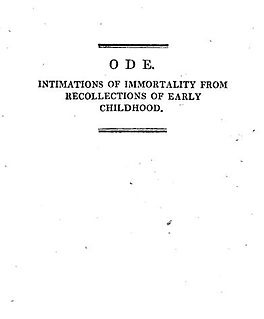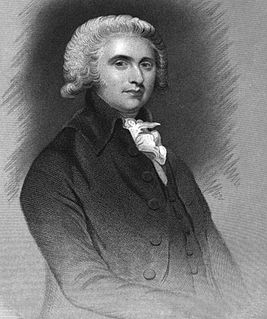Related Research Articles

Kubla Khan: or, A Vision in a Dream: A Fragment is a poem written by Samuel Taylor Coleridge, completed in 1797 and published in 1816. According to Coleridge's preface to Kubla Khan, the poem was composed one night after he experienced an opium-influenced dream after reading a work describing Xanadu, the summer palace of the Mongol ruler and Emperor of China Kublai Khan. Upon waking, he set about writing lines of poetry that came to him from the dream until he was interrupted by "a person from Porlock". The poem could not be completed according to its original 200–300 line plan as the interruption caused him to forget the lines. He left it unpublished and kept it for private readings for his friends until 1816 when, at the prompting of Lord Byron, it was published.

"Ode: Intimations of Immortality from Recollections of Early Childhood" is a poem by William Wordsworth, completed in 1804 and published in Poems, in Two Volumes (1807). The poem was completed in two parts, with the first four stanzas written among a series of poems composed in 1802 about childhood. The first part of the poem was completed on 27 March 1802 and a copy was provided to Wordsworth's friend and fellow poet, Samuel Taylor Coleridge, who responded with his own poem, "Dejection: An Ode", in April. The fourth stanza of the ode ends with a question, and Wordsworth was finally able to answer it with seven additional stanzas completed in early 1804. It was first printed as "Ode" in 1807, and it was not until 1815 that it was edited and reworked to the version that is currently known, "Ode: Intimations of Immortality".
- The poem is an irregular Pindaric ode in 11 stanzas that combines aspects of Coleridge's Conversation poems, the religious sentiments of the Bible and the works of Saint Augustine, and aspects of the elegiac and apocalyptic traditions. It is split into three movements: the first four stanzas discuss death, and the loss of youth and innocence; the second four stanzas describes how age causes man to lose sight of the divine, and the final three stanzas express hope that the memory of the divine allow us to sympathise with our fellow man. The poem relies on the concept of pre-existence, the idea that the soul existed before the body, to connect children with the ability to witness the divine within nature. As children mature, they become more worldly and lose this divine vision, and the ode reveals Wordsworth's understanding of psychological development that is also found in his poems The Prelude and Tintern Abbey. Wordsworth's praise of the child as the "best philosopher" was criticised by Coleridge and became the source of later critical discussion.
"Monody on the Death of Chatterton" was composed by Samuel Taylor Coleridge in 1790 and was rewritten throughout his lifetime. The poem deals with the idea of Thomas Chatterton, a poet who committed suicide, as representing the poetic struggle.
The Destruction of the Bastile was composed by Samuel Taylor Coleridge in 1789. The poem describes Coleridge's feelings of hopes for the French Revolution as a catalyst for political change.
Songs of the Pixies was composed by Samuel Taylor Coleridge during 1793. The poem describes Coleridge's summer vacation and his childhood home. It also incorporates Coleridge's own view of himself as a young poet.
Lines Written at Shurton Bars was composed by Samuel Taylor Coleridge in 1795. The poem incorporates a reflection on Coleridge's engagement and his understanding of marriage. It also compares nature to an ideal understanding of reality and discusses isolation from others.
Lines on an Autumnal Evening was composed by Samuel Taylor Coleridge in 1793. The poem, rewritten throughout Coleridge's life, discusses nature and love. As Coleridge developed and aged, the object of the poem changed to be various women that Coleridge had feelings toward.
Ode on the Departing Year was composed by Samuel Taylor Coleridge in 1796. The poem describes Coleridge's feelings on politics and religion, and it emphasises an idyllic lifestyle as an optimal way of living.

The conversation poems are a group of at least eight poems composed by Samuel Taylor Coleridge (1772–1834) between 1795 and 1807. Each details a particular life experience which led to the poet's examination of nature and the role of poetry. They describe virtuous conduct and man's obligation to God, nature and society, and ask as if there is a place for simple appreciation of nature without having to actively dedicate one's life to altruism.
The Eolian Harp is a poem written by Samuel Taylor Coleridge in 1795 and published in his 1796 poetry collection. It is one of the early conversation poems and discusses Coleridge's anticipation of a marriage with Sara Fricker along with the pleasure of conjugal love. However, The Eolian Harp is not a love poem and instead focuses on man's relationship with nature. The central images of the poem is an Aeolian harp, an item that represents both order and wildness in nature. Along with the harp is a series of oppositional ideas that are reconciled with each other. The Eolian Harp also contains a discussion on "One Life", Coleridge's idea that humanity and nature are united along with his desire to try to find the divine within nature. The poem was well received for both its discussion of nature and its aesthetic qualities.
Reflections on Having Left a Place of Retirement is a poem written by English poet Samuel Taylor Coleridge in 1796. Like his earlier poem The Eolian Harp, it discusses Coleridge's understanding of nature and his married life, which was suffering from problems that developed after the previous poem. Overall, the poem focuses on humanity's relationship with nature in its various aspects, ranging from experiencing an Edenic state to having to abandon a unity with nature in order to fulfill a moral obligation to humanity. The discussion of man's obligation to each other leads into a discussion on the difference between the life of a philosopher and the life of a poet. By the end of the poem, the narrator follows the philosophical path in a manner similar to what Coleridge sought to do. The response to the poem from critics was mostly positive, with many of them emphasizing the religious aspects of the work in their analysis.
"This Lime-Tree Bower My Prison" is a poem written by Samuel Taylor Coleridge during 1797. The poem discusses a time in which Coleridge was forced to stay beneath a lime tree while his friends were able to enjoy the countryside. Within the poem, Coleridge is able to connect to his friend's experience and enjoy nature through him, making the lime tree only a physical prison, not a mental one.
To a Young Ass was composed by Samuel Taylor Coleridge in 1794. The poem describes Coleridge's sympathies for animals and the connection to nature he felt as part of his idea of Pantisocracy. It was later used by critics as a means to mock him.
Frost at Midnight is a poem by Samuel Taylor Coleridge, written in February 1798. Part of the conversation poems, the poem discusses Coleridge's childhood experience in a negative manner and emphasizes the need to be raised in the countryside. The poem expresses hope that Coleridge's son, Hartley, would be able to experience a childhood that his father could not and become a true "child of nature". The view of nature within the poem has a strong Christian element in that Coleridge believed that nature represents a physical presence of God's word and that the poem is steeped in Coleridge's understanding of Neoplatonism. Frost at Midnight has been well received by critics, and is seen as the best of the conversation poems.
Fears in Solitude, written in April 1798, is one of the conversation poems by Samuel Taylor Coleridge. The poem was composed while France threatened to invade Great Britain. Although Coleridge was opposed to the British government, the poem sides with the British people in a patriotic defense of their homeland. The poem also emphasizes a desire to protect one's family and to live a simple life in harmony with nature. The critical response to the poem was mixed, with some critics claiming that the work was "alarmist" and anti-British.
"Dejection: An Ode" is a poem written by Samuel Taylor Coleridge in 1802. The poem in its original form was written to Sara Hutchinson, a woman who was not his wife, and discusses his feelings of love for her. The various versions of the poem describe Coleridge's inability to write poetry and living in a state of paralysis, but published editions remove his personal feelings and mention of Hutchinson.
To William Wordsworth is a poem by Samuel Taylor Coleridge written in 1807 as a response to poet William Wordsworth's autobiographical poem The Prelude, called here "that prophetic lay". Wordsworth had recited that poem to his friend Coleridge personally. In his poem, Coleridge praises Wordsworth's understanding of both external and human nature, at the same time emphasizing Wordsworth's poetic achievement and downplaying his own.
Sonnets on Eminent Characters or Sonnets on Eminent Contemporaries is an 11-part sonnet series created by Samuel Taylor Coleridge and printed in the Morning Chronicle between 1 December 1794 and 31 January 1795. Although Coleridge promised to have at least 16 poems within the series, only one addition poem, "To Lord Stanhope", was published.

"To Erskine" or "To the Hon Mr Erskine" was written by Samuel Taylor Coleridge in November 1794. The subject of the poem is Thomas Erskine, a lawyer and member of the Whig party, who successfully served in the defense of three political radicals during the 1794 Treason Trials. Coleridge admired Erskine's defense and praised his refusal to accept money for his service. The poem was published in the 1 December 1794 Morning Chronicle as part of the Sonnets on Eminent Characters series. It was later included in various collections of Coleridge's poetry published later.
Hymn Before Sunrise is a poem written by Samuel Taylor Coleridge in 1802. Originally published in The Morning Post, it describes feelings that Coleridge claimed to have experienced on his own. However, it was later revealed that parts of the poem were heavily influenced by a poem by Friederike Brun, which led to criticism against Coleridge for not acknowledging his sources. Aspects of the poem did have direct origin in Coleridge's own life and experiences, and the work represents one of the last times a poem captured his feelings of joy during that period of his life.
References
- Ashton, Rosemary. The Life of Samuel Taylor Coleridge. Oxford: Blackwell, 1997.
- Chainey, Graham. A Literary History of Cambridge. Cambridge: Cambridge University Press, 1995.
- Coleridge, Samuel Taylor (1921). Coleridge, Ernest Hartley (ed.). The Poems of Samuel Taylor Coleridge. Oxford University Press.
- Colmer, John. Coleridge: Critic of Society. Oxford: Clarendon Press, 1959.
- Gregory, Alan. Coleridge and the Conservative Imagination. Macon: Mercer University Press, 2003.
- Holmes, Richard. Coleridge: Early Visions, 1772-1804. New York: Pantheon, 1989.
- Mays, J. C. C. (editor). The Collected Works of Samuel Taylor Coleridge: Poetical Works I Vol I.I. Princeton: Princeton University Press, 2001.
- Sisman, Adam. The Friendship: Wordsworth & Coleridge. New York: Viking, 2007.
- Strachan, John. Advertising and Satirical Culture in the Romantic Period. Cambridge: Cambridge University Press, 2007.